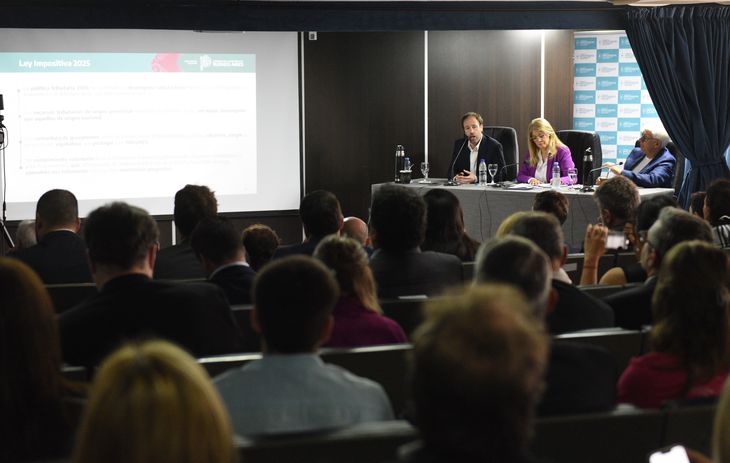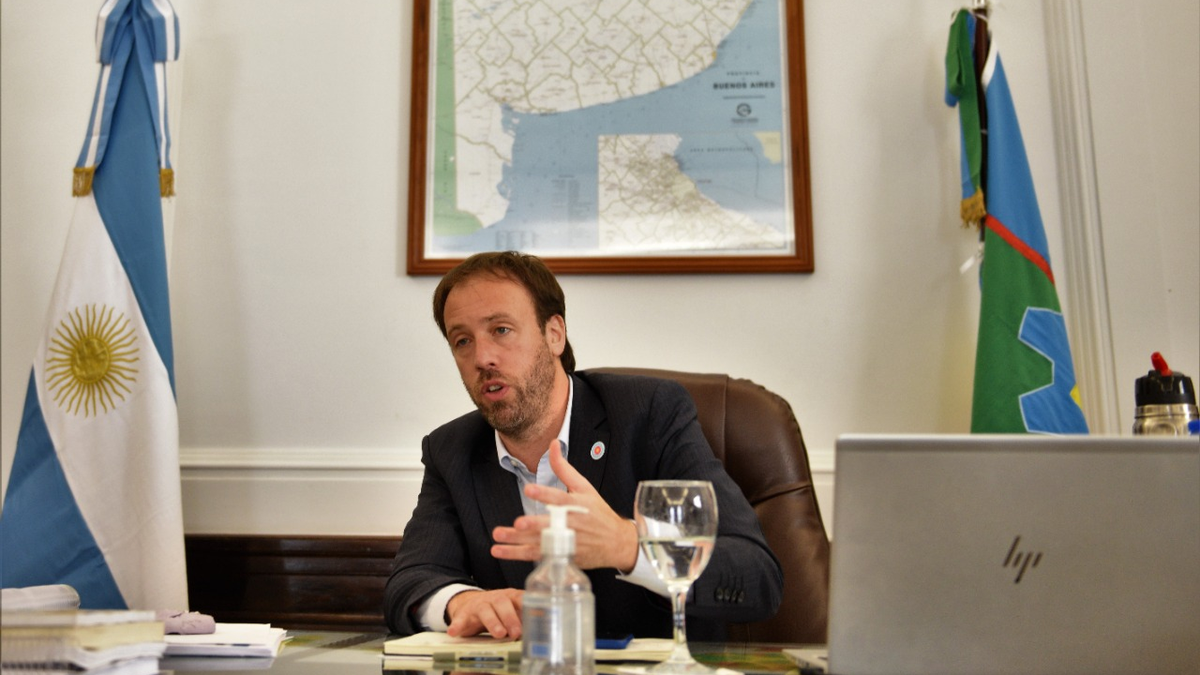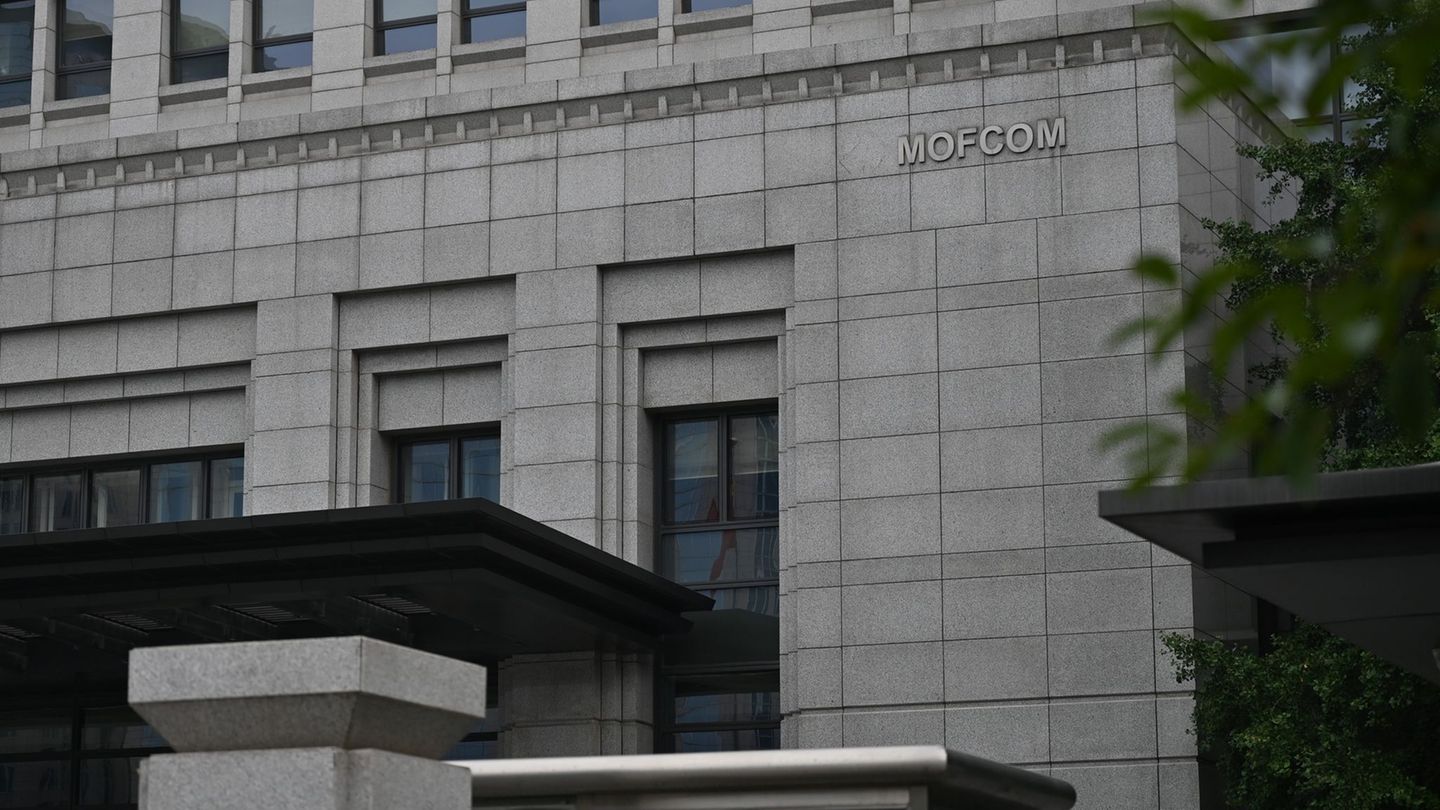Budget 2025 (18).JPG
Pablo López, during the presentation of the Budget in the Buenos Aires Legislature.
Meanwhile, for Education, $1,287,061 million will be allocated to extend the full day, incorporate the mandatory 3-year classroom and reform the secondary school curriculum. $747,844 million will also be allocated to environmental policies and $1.4 billion to reduce gender gaps.
At the same time, the official explained that infrastructure “continues to be key” for the Buenos Aires administration, highlighting that “in 2024, we were able to continue public works despite the difficulties and in contrast to the Nation, which paralyzed all work” and stressed that “The investment in this sense will be 7.8% of the total budget expenditure.”
“It represents a record for the province. We have been increasing investment in public works year after year. This year there was continuity of the work, but also a lot of difficulty because prices skyrocketed and there were works that were slowed down due to the context. The idea is in 2025 to be able to resume the pace that we had until 2023”he pointed out.
He anticipated that investment will continue in “road and urban infrastructure, housing plans, water programs, and school, health and prison works because it is key to the development of the province.”
The minister stressed that financing is supported by multilateral loans without requesting new authorizations for 2025. “This year we achieved disbursements of almost 400 million dollars and we hope to reach 500 million in 2025,” he explained, thanks to current credits that allow us to advance without need. of more debt in foreign currency.
Debt restructuring
“The other point has to do with having been able to carry out a successful debt restructuring in 2021which greatly reduced the weight of debt in the budget. What the province allocates to face its debt, in the 2019 budget was 20% and today it is 7 or 8%, even though we have already begun to amortize the capital of external bonds,” he commented.
López maintained that this year they have already been paid, in addition to the interest230 million dollars of capital. “That is a debt reduction in foreign currency. And next year we will be paying close to 300 million dollars only capital,” said López and opined that “these are levels well below” those they received from the administration of Maria Eugenia Vidal“where payments of 1.5 billion dollars per year had to be faced.”
“The debt in foreign currency is on a sustainable path of maturity profile, which allows us to better manage the budget and allocate greater funds to the items that are key and that have to do with our axes,” he stressed.
In that sense, he asserted that the portfolios of Production, Agrarian Development, Labor and Provincial Bank “policies are promoted to support the productive sectors” and highlighted that “despite being governed by the parameters of the national budgetour budget has an imprint that makes it clear that the priorities of the provincial government do not have to do with the adjustment but with the provincial State continuing to be present, providing answers to the people of Buenos Aires and replacing the national administration in cases in which he retires.”
In this framework, he analyzed that “the pressure on subnational states is greater than before because the national State does not take care of issues that it previously took care of and because it cuts resources.” However, he stated that “this year we were able to demonstrate that we can meet the objectives and set priorities for 2025 with a State that provides answers.”
The Tax Law
“Within the framework of the Tax Law, we work hard to ensure that the tax burden on the productive sectors, workers and all inhabitants of the province is not increased, with which we are not foreseeing any increase in rates in the Income Tax. Brutes”Lopez stated.
The head of the Economy portfolio later specified that in property taxes “an adjustment is simply foreseen without real increases, in line with the path of price increases”which according to Nación will be around 18.5%, and noted that “an aggressive policy of bonuses is projected both for advance payment and as a reward for good performers (those who do not have debt), which completes a Tax Law “That is not going to generate a greater tax burden on the people of Buenos Aires.”
Budget 2025 (23).JPG

He assured that the government will once again have the possibility of indexing the Real Estate and Automobile Tax fee during the course of the year based on price variations and clarified that no advance payment will be charged. Gross Income to large companies and explained that there will be no additional installments of property taxes.
Subsequently, the official ruled out the possibility of joining the Money laundering tax law established by Javier Milei as other provinces did.
The salary guideline
“The salary guideline is always raised in the same way: it is defined within the framework of joint negotiations, in collective negotiations throughout the year. Logically, based on the budget numbers, we mark an indicative path. “We seek to ensure that real wages can accompany the process of price growth and, to the extent that resources allow, can grow and recover purchasing power,” The minister explained and celebrated that, in 2024, “practically every month of the year a salary increase could be given.”
“Our objective continues to be the improvement in both the quality of work and purchasing power within the fiscal limits that the province has. We understand that it is very important that if we want to build a present State, that provides answers and better quality services, we require workers who have increasingly better working conditions, increasing salaries and better capabilities, for which we must provide answers.”
On the other hand, the official specified that “the request for authorization to take on new debt is approximately 1.1 billion pesos.” and explained: “We need financing for 2.4 billion. A part of this financing is achieved with loans already in progress from multilateral credit organizations. Another part is the lyrics program that we already have, which is permanently in effect. There is an incremental of 670 million, which is marginal. And the fundamental amount of new debt is 1,156,806 million, which is significantly less than what we asked for last year.”
The minister clarified that the project does not contemplate a Municipal Infrastructure Fund, as was done in other years, but acknowledged that “it will be something that will be seen based on the conversations” held with the legislators.
Debt Recovery Fund
“We are facing an anomalous scenario, it has never happened in 30 years that the national government interrupts non-automatic transfers, which are mandatory because they are enshrined in laws, decrees and signed agreements,” he continued and exemplified that “by having interrupted the transfers, “A large amount of debt was accumulated with all the provinces.”
He recalled that, for this reason, The province initiated administrative claims and lawsuits before the Supreme Court. “It is uncertain how this process will evolve, but since the situation is anomalous and the amount of funds owed to us is many, this year we created in the budget law a Debt Recovery Fund with the national government,” he explained.
“This fund will be nourished from the resources that are integrated when an agreement is reached with the national government or when it decides to pay that debt. The destination of the fund will depend on the type of resources that come in, because there are debts that have to do with funds for a specific destination – such as those of the pension system, what ANSES owes to support the provincial system – and others linked to security,” he continued and He added that “they will be used for those functions for which they are established or to finance the works plan.”
He considered that “the government should send these resources because they are debts to the provinces” and highlighted that Buenos Aires “is the province that has the fewest public employees per inhabitant, the one that has the least total expenditure per inhabitant, which is why a Buenos Aires resident “He is at a disadvantage compared to a citizen of another province because his State has fewer resources to allocate for basic functions and provide quality services.”
“The province is very large, representing 40% of the country in terms of population and any parameter one looks at. The numbers in absolute terms are large. But the correct way to look at them is in relative and contextual terms, where it is seen that the Buenos Aires State does not spend much, but on the contrary: it has an expenditure that, per inhabitant, is the lowest of all the provinces in the country. We cannot ask for more effort from the province,” he concluded.
Source: Ambito
I am Pierce Boyd, a driven and ambitious professional working in the news industry. I have been writing for 24 Hours Worlds for over five years, specializing in sports section coverage. During my tenure at the publication, I have built an impressive portfolio of articles that has earned me a reputation as an experienced journalist and content creator.



